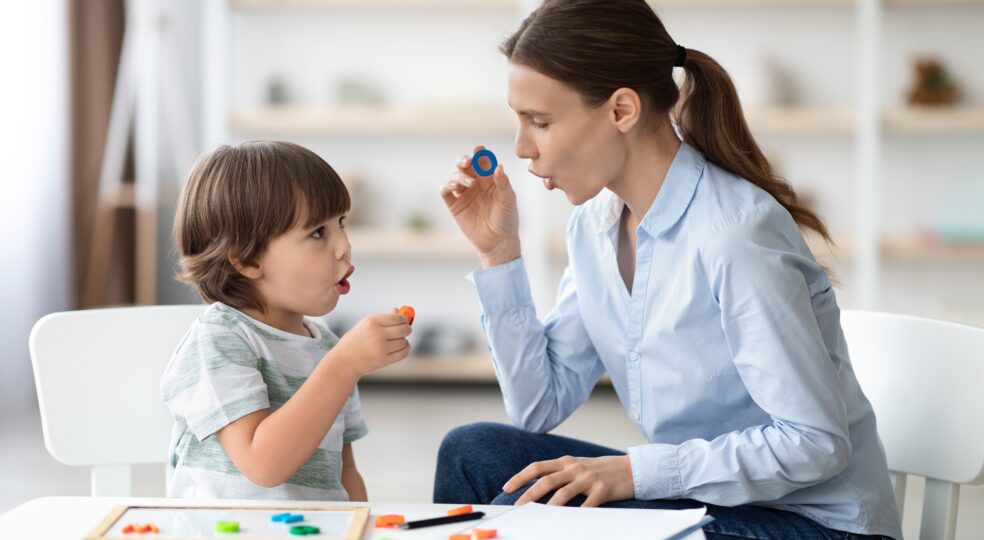
Many parents worry about their children's language development. Perhaps you have a little chatterbox at home who talks and talks all day long. Or maybe your child speaks much less than their playmates of the same age? How the language development in children and when you need to ask for support. you can find out in the following article.
Before we turn to the support options, it is important to understand how language development works in children in the first place. This process is in no way comparable to learning a foreign language as an adult. Children learn to speak with all their senses: by seeing, hearing, experiencing and feeling.
Added to this is a child's innate willingness to communicate with its environment. The necessary skills for linguistic communication are already present in healthy newborns. Children develop their understanding of language through learning experiences, repetition and naming activities and objects, until at some point they attempt to speak for the first time.
When children learn to speak varies from person to person. There is a wide range of what is considered "normal". There are children who speak their first words at the age of ten or eleven months. On average, however, the first conscious word is spoken around the first birthday. These are often simple words such as mommy, daddy, ball or there.
This is followed by two-word sentences, which is the case at around one and a half years of age: "Mama da", "Ball (ka)putt", "Oma aua". A rough guideline among pediatricians is that a two-year-old child should speak at least 50 words. In the months after the second birthday, the vocabulary rapidly increases to over 200 words, with the child now also using their speech melody to ask questions: "Mommy gone?"
At around two and a half years of age, most children begin to talk about themselves in the first person. Baby talk (e.g. "Wauwau" instead of dog) should gradually disappear. If your child does not yet pronounce all the words correctly, this is no cause for concern. Longer and longer sentences will be formed and children will start to use the past tense.
Interesting to know: If a child speaks only a few words at 24 months, it is referred to as a Late Talker. However, most children make up the language deficit completely by their fourth birthday.

In order to delve even deeper into the topic of "children's language development", we would like to take a closer look at the prerequisites for healthy language development:
Tip: You can find a compact overview of the requirements and conditions for successful language acquisition in the following scientific textbook.
Many parents are unsettled when their child does not speak or does not speak at an age-appropriate level. In the following, we will look at the possible causes. These can be both physiological and psychological in nature.
As already mentioned, an undetected hearing impairment is a common reason why an otherwise normally developed and bright child does not want to speak. One possible sign may be, for example, a lack of interest in reading stories or listening to audio books. Of course, only a pediatrician can make a definitive diagnosis.
In rare cases, genetic or neurological causes can be the reason for delayed or even absent language acquisition. These include, for example, brain injuries (aphasia). Children who had to be artificially ventilated in the first few weeks of life also learn to speak later on average than their peers.
In order to learn language, your child needs communicative stimuli. This is evident from several scientific studies emerge. Children who are not spoken to do not learn language on their own. This is completely independent of their personal intelligence.
For children who have a psychological trauma (e.g. violence or abuse), speech development also stagnates or comes to a complete standstill. Even children who were already able to speak often fall silent after traumatic experiences. In technical terminology Mutism the speech.
It is important to differentiate between total and selective mutism. In selective mutism, children communicate in an age-appropriate manner at home, but fall completely silent when they leave their familiar surroundings (e.g. at nursery school). The reasons for this are Fears and inhibitions that can be treated therapeutically. Affected children can also change their behavior not control at will.
First of all: Keep calm! Just because your child speaks less than their peers does not necessarily mean that they need treatment. Every child develops individually. However, to avoid missing out on early support opportunities, you should contact your pediatrician as a precaution if your child only speaks a few individual words at the age of two.
If all organic causes have been ruled out, you can motivate your child to speak through play. Role-playing games, for example, are a good option. Perhaps your child also finds it easier to talk to a cuddly toy? This may sound strange, but some children feel very inhibited in direct interpersonal contact.
There are lots of tips and advice on the topic of "children's language development". We have summarized the most successful approaches for you:
To ensure that your child's language development runs smoothly, you should lay the foundation from an early age. Talk to your baby a lot and maintain eye contact. Name the things they point to correctly and not in baby talk. Depending on their age, your child may even repeat the word.
You can also add the first one-word sentences. For example, if your child says "cat", continue the sentence: "Yes, that's our cat. She's thirsty and is getting milk now." Another tried and tested method that gives children lots of fun and motivates them to speak is reciting nursery rhymes and singing songs.
Many parents are keen to ask their children questions that are as simple as possible and can only be answered with a yes or no. However, in order to promote your children's language development, you should give them a little more confidence. Deliberately ask "open questions": Why? How? Why? This way, your child will have to use their entire vocabulary to answer. And as the saying goes: practice makes perfect.
Example
One thing is undisputed when it comes to the topic of "children's language development": for children to learn language, parents need to talk to them! You can do this quite simply by accompanying all everyday activities with language. Are you folding the laundry, cooking lunch or putting a jacket on your child? Explain to your child exactly what you are doing and why.
Young children in particular often make mistakes when speaking. As adults, we often tend to correct the child directly: "That's not shouted, it's screamed!" Although the idea behind immediate correction is understandable, constant correction can demotivate the child and thus inhibit speech.
A good alternative is to use so-called corrective feedback: "Yes, exactly. The boy shouted really loudly!" This allows you to correct the grammatical error without directly pointing out to your child that they have done something wrong.
To encourage your child's language acquisition, it makes sense to use the words they already know in different contexts. In this way, your child learns how the word changes (past and present) and what meanings it can have.
As in so many respects, the same applies to the topic of "children's speech development": every child follows their own pace! However, if your child speaks little or not at all at the age of two, a pediatrician should be consulted to rule out serious causes. Depending on the personal situation, speech therapy is often advisable in order to introduce the child to speech in a playful way.
For older children who have problems at school due to their delayed language development, a Professional learning coaching can be helpful. A learning coach will support your child, to build up self-confidence and develop their own strengths which in turn has a positive effect on language motivation and therefore on further language development. In this context, we would also like to introduce you to our Free of charge Recommend e-book.

